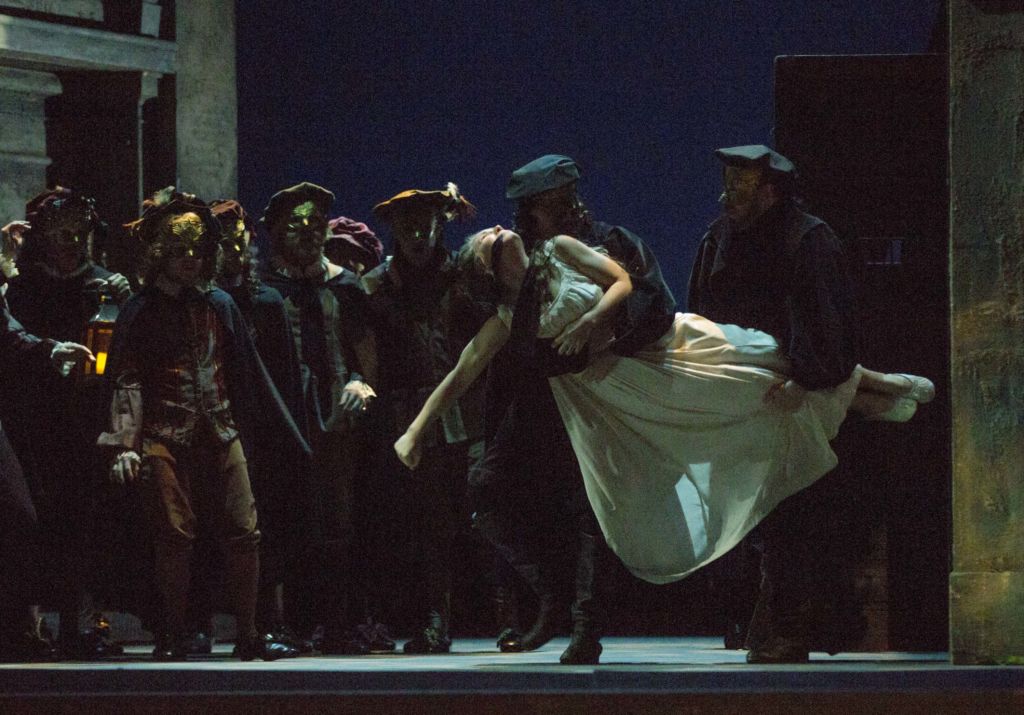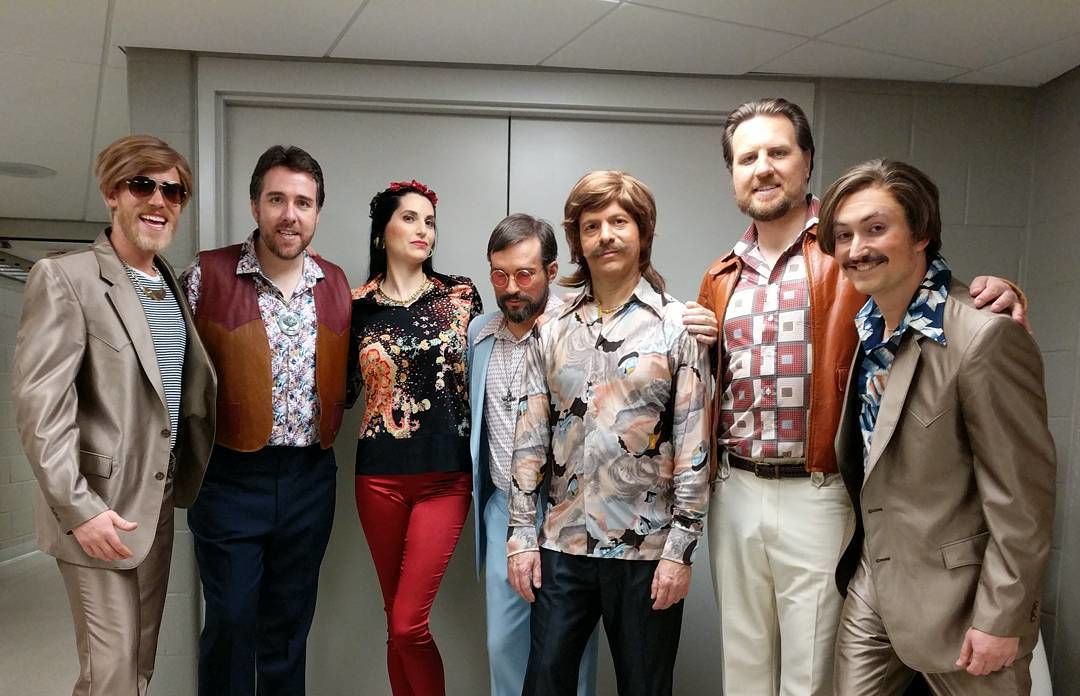(pictured above: Chris Morrow (far R) with other supernumeraries during Austin Opera’s Carmen, November 2017.)
By: Chris Morrow, Senior Developer at inQuest, Founding Volunteer Instructor at Code2College, and Austin Opera Supernumerary
Like most software developers, I spend a lot of my day staring at a screen. “How am I going to write this?” or “Why is this not working!?” are pretty common thoughts as I’m racking my brain to find elegant solutions for the project I’m working on. After a while, it gets tiresome, and I need a change of pace before diving right back in. I find it’s easier to stay focused and centered on my work by having a hobby. For me, one of those hobbies is performing with Austin Opera.
What do you do in an Opera?
I do have some musical training and background; however, I don’t sing in the opera. I’m what’s called a “supernumerary,” which is like being an extra in a movie or TV show (non-speaking or non-singing part). You can usually find me on stage as a waiter, soldier, or guard. I’ve had to learn to sword fight for a scene on stage, I drove a pedicab, pretended to beat someone up, fired muskets, and climbed over a wall on a ladder. I’ve carried spears, halberts, swords, tables, chairs, ropes, lanterns, and even an opera singer. I’ve worn big, heavy coats, armor, hospital scrubs, overalls, capes, masks, fake mustaches and beards, lots of different hats, and more tights than I can remember. For one opera, I even had to grow a real mustache. I’ve also had to learn how to put on my own makeup, something I had no idea how to do before I started doing opera. I’ve enjoyed my experiences so far, and it’s also just a tremendous honor to be on stage with such tremendous artists for each production. My roles in the opera have also led me to a lot of new great friendships too.
How did you get involved with the Opera?
I first got involved with the opera in 2012. When I initially moved to Austin, my wife got a job working for Austin Opera in 2011. While watching one of the operas, my wife pointed out that one of her friends was on stage as one of the main character’s handmaidens. “She’s a supernumerary, which is like being an extra in a movie,” she explained. I had done a little bit of acting before and enjoyed it, so I told her if they needed someone in an upcoming opera, to let them know that I’m interested. About a month later, I got an email asking if I was available because someone had dropped out at the last minute, and they needed someone to start rehearsals the next day. After checking with my boss first, I agreed, and luckily, I also fit into the costume. Since my first production, I’ve been in 13 operas and hope to keep doing more.

What is it like being in an Opera and on stage?
It’s a lot of work to put on an opera. The performance is like a perfectly timed machine, requiring a ton of coordination by everyone involved. There are multiple elements that go into putting together an opera production: principal singers/soloists, chorus, stage/scenery, stage crew, assistant stage managers, conductor, orchestra, lighting designers, costume dressers, and other essential personnel. I personally have to memorize several movements across the stage, which props to pick up when, how to interact with other characters, and what to do with my facial expressions and body language.
For each opera production, I am assigned a specific time when I need to arrive (a.k.a. “call time”). When I arrive, I sign in to mark my attendance and then head directly to the dressing rooms. Most of the time, I share a dressing room with the other supernumeraries or men’s chorus, where I have my own chair, makeup, and hanger space to store my costumes. After applying my stage makeup, I head to the wig room, where the stylists help me put on my wig. Wigs and costumes never leave the backstage area, and we are not allowed to put on our own wigs, to make sure that they will stay clean and in good condition for the duration of the performance. The wigs might also be reused for other productions later, which is another reason that only wig and makeup staff handle the wigs.
After putting on my wig, I head back to the dressing room where my costume dresser helps me and the other supernumeraries to put on our costumes. Then, we wait to listen over the intercom in the dressing room for the stage manager to give us our call to come to the backstage area, which is five minutes before our entrance will occur on stage. We wait backstage and then one of the assistant stage managers will give us our cue when to go out on stage. Sometimes, I have to go back to the wig room, and change wigs and costume in order to play a different role. In some cases, the changes are so fast, I don’t have enough time to go back down to the dressing room, so the wig stylists and costume dressers help me change backstage for what is called a “quick change.”
At the end of the performance, the curtain goes up and it is time for bows. It is always a great feeling to hear a full house of applause when we are taking our bows. Surprisingly, it’s also fun to get “boo’s” too, especially when I was playing a bad guy because it means we played our roles convincingly, and it’s all in good fun.
How do you have time to be in the Opera with work?
Being in an opera production requires a large time commitment, but I personally think it’s a lot of fun. Each day, I work at my day job, teach/volunteer with Code2College on days when I have class, and then head to opera rehearsals around 7:00 p.m. Rehearsals last about 3-4 hours per session, and there are anywhere from 10-14 rehearsals for supers. It takes weeks of rehearsals to put together an opera production. The rehearsals are not performed in chronological order, but rather in smaller chunks that make it easier to learn your parts. There is also no scenery yet, but rather colorful tape on the floor that indicates where the scenery will be. The director and other choreographers will teach us our “blocking,” or the movements we will do during the opera (where we stand, which directions to walk, fight choreography, or even how we interact with other cast members). Initially, rehearsals take place with music, but just on piano (not with full orchestra yet). If we have any fights, a fight choreographer may have special rehearsals with us. It is important that all the blocking happens in time with the music, so I often have to adjust my actions or walking speed to make sure I get to where I need to be at the right time.
Rehearsals initially begin at the opera offices in their rehearsal hall. Then, one week before the performances begin, the rehearsals move down to the Long Center so that we can begin rehearsing with lighting cues, the full set, and eventually, the full orchestra. This is called “tech week.” During tech week, we adjust blocking for the actual set and each night add costumes, then wigs and makeup, and finally the full orchestra. All of our rehearsal efforts culminate with the final dress rehearsal, which occurs two days before opening night. For the final dress rehearsal, Austin Opera invites students from around Greater Austin and certain patrons to attend, which is our first chance to perform the production in front of a live audience.
What if you mess up?
People sometimes ask me “what happens if you mess up?”. So far, I have been fortunate not to have made any major mistakes on stage. We often have gone over our parts so many times in rehearsals that by the time the performances come around, it comes almost as second nature and I usually don’t have a problem with stage fright. The lights on stage are so bright that you can’t even see the audience in the hall. However, when in doubt, my advice is if you make a mistake, own it, act your way out, and move forward. The more indecisive and nervous you appear, you will draw attention to the mistake, and then the audience will pick up on it. Essentially, the mistake already happened, it’s over, and you don’t want to make another error by fixating on the current flub. It’s important to remember that though the mistake might seem like a huge deal to you, you as a super are not the star, so the less you can do to draw attention to yourself, the better.
How can I support the Opera?
People are often surprised to learn that less than 40% of most arts nonprofits’ revenue comes from ticket sales; the rest comes from unearned revenue like donations. With the hard-hitting effects of the Coronavirus, many arts nonprofits have already had to cancel their remaining seasons and performances. Austin Opera can use your support now more than ever. Opera performances bring not only significant cultural events to Austin, but they also bring jobs for the local singers, orchestral musicians, and crew who live and work right here in Austin. To donate visit: https://austinopera.org/support/. To learn more about the operas for next season or buy tickets, visit here: https://austinopera.org/tickets/.




